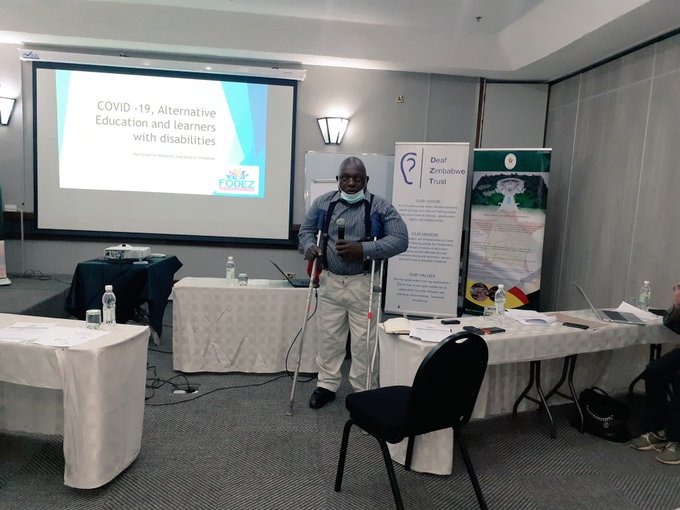|
Getting your Trinity Audio player ready...
|
People with disabilities are facing a plethora of challenges in accessing COVID-19 vaccines, a situation that exposes them to the vagaries of the deadly pandemic.
Zimbabwe has plans to administer the vaccines to at least two-thirds of the country’s entire population as a means of curbing the spread of the COVID-19 pandemic.
In response, campaigners are calling on the government to prioritise people with disabilities in vaccine rollouts. They are also calling for health information campaigns and vaccination sites to be accessible and inclusive for all. Growing global evidence shows that people with disabilities have been disproportionately impacted by COVID-19.
Countries like China, Russia, and India have been at the forefront of supplying vaccines to the country. According to the latest Reuters COVID-19 tracker, 90 infections were recorded per 100 000 people reported last 7 days.
“The report said COVID-19 infections in Zimbabwe are at their peak — the highest daily average reported — now at 1,884 new infections reported each day. There have been 66,853 infections and 2,126 coronavirus-related deaths reported in the country since the pandemic began.”
With these statistics, Agness Chindimba, the Executive Director of Deaf Women Included said there were challenges among most PWDs in accessing vaccines.
Chindimba recommended that there was a need to ensure that vaccination points are accessible to PWDs.
“In the first instance, there is a need to ensure that COVID-19 vaccines should reach out to PWDs. We need to make sure that PWDs are provided with accessible information on vaccination. Currently, there are myths about vaccine and vaccination that is preventing many from going for the jabs. With the queues it is very difficult for many to access the vaccination centres,” Chindimba said.
She encouraged stakeholders to prioritize PWDs like what they do with the elderly and those with chronic diseases.
“Relevant authorities should also consider giving priority to PWDs. They should not stand in queues. There is a need for further explanation to PWDs on what is vaccination. There is a lot of false information on the COVID-19 vaccines. Some PWDs are resisting the vaccine due to lack of correct information,” Chindimba added.
MacDonald Munganasa, a recent university graduate with a disability said sharing of information about COVID 19, in general, should be inclusive.
“That means to say it needs to be improvised to cater for all forms of disabilities. It even includes the aspect of providing information with regards to the vaccination program itself. People with disabilities must be able to access the vaccines from an informed position. On the other hand, the vaccination program must be decentralised such that issues of mobility will not continue to be a problem. Nowadays movement of people in terms of transportation is a burden. This induces a double disability to fellows with impairments. That means the Government itself must spearhead a decentralised program of vaccination such that all persons with disabilities must be reached. We don’t want to flock to one place for vaccines,” Munganasa said.
Kuda Mapeture, a young woman with a hearing impairment called on the need to improve communication on vaccines.
“Sign language providers must be of service when deaf people want to understand information about Covid-19 vaccination. The language should be simple for PWD to understand. We also want to know where Covid-19 vaccination services are in communities. These must be near to PWDs’ homes for easy access,” Mapeture said.
She emphasized the need to decentralise services. She said that way, PWDs with mobility challenges can easily access their services.
“Imagine a wheelchair user or one with multiple disabilities being transported to Parirenyatwa Hospital from as far as Chitungwiza. They may be required to go there twice a week and awaiting their chance in a queue for vaccines. That will become burdensome.”
There are calls to increase the advertisement of the vaccine so that it reaches all the PWDs.
“I advocate more of acting when advertising vaccines so that the concept is better understood than writing of heavy words that are difficult to understand. For deaf people, the use of more of visuals can be interesting and educational. That will go a long way in promoting inclusivity on accessing vaccines,” Chindimba added.
The Acting Director for the National Association of Societies for the Care of the Handicapped (NASCOH), Mr. Henry Masaya writing in their letter to the government expressed concerns about the way in which the current vaccination is being rolled out. Masaya stated in the letter that the national vaccination plan of Zimbabwe should prioritize reaching persons with disabilities, particularly persons with intellectual disabilities and high support needs, persons living in congregate settings, older persons, and persons with health conditions that put them most at risk.
Equally important, Peter Bare who is the Senior Programme Manager for Sightsavers, calls for organisations for persons with disabilities to speak with one voice in engaging the government and highlighting their concerns about the current COVID-19 programmes. Bare welcomed the government’s plan to vaccinate at least two-thirds of the population but cautioned that people with disabilities should not be marginalised or forgotten in this. They have to be prioritised in vaccine rollouts and representative organisations consulted on how to do so.
This call is part of Sightsavers ‘Equal World campaign’, which is working with partners in Zimbabwe to demand the government vaccinate people with disabilities as a priority at-risk group. It is part of an international campaign running in countries across Africa and Asia. Equal World is also calling on governments to make health information and vaccination sites accessible and inclusive, and for organisations of persons with disabilities to be meaningfully included in COVID-19 responses.
Bare says, “In this crisis, people with disabilities have been trying to survive without the recognition or support they need. As the world faces a historic moment to test existing commitments to equity, equality, and universal health care, we must make sure nobody is left behind.”






